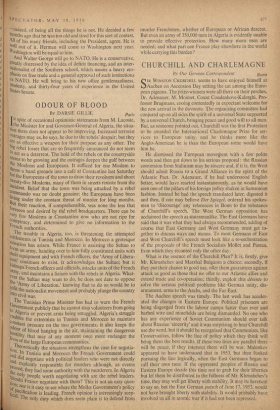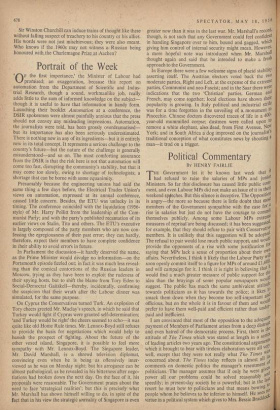CHURCHILL AND CHARLEMAGNE
By Our German Correspondent Bonn SIR WINSTON CHURCHILL seems to have enjoyed himself at Aachen on Ascension Day setting the cat among the Euro- pean pigeons. The prize-winners were all there on their perches, Dr. Adenauer, M. Monnet, Count Coudenhove-Kalerghi. Pro- fessor Brugmans, cooing contentedly in expectant welcome for the new arrival in the dovecote. The organising committee had conjured up on all sides the spirit of a universal State supported by a universal Church, bringing peace and good will to all men. But, as someone pointed out. Churchill was the first Protestant to be awarded the international Charlemagne Prize for ser- vices to European unity, and he thinks more like the Anglo-American he is than the European some would have him be.
He dismissed the European move0ent with a few polite words and then got down to his serious proposal : the Russian conversion from Stalinism, may be sincere and, if it is. the West should admit Russia to a Grand Alliance in the spirit of the Atlantic Pact. Dr. Adenauer. if he had understood English better, would have reacted instantaneously, as he would have seen one of the pillars of his foreign policy shaken in Samsonian fashion. Instead he had the speech translated later, digested it and then, if one may believe Der Spiegel, ordered his spokes- men to 'discourage' any references in Bonn to the substance of Churchill's speech. The West German opposition has acclaimed the speech as statesmanlike. The East Germans have said that it was what they had always recommended, adding of course that East Germany and West Germany must get to- gether to discuss ways and means. To most Germans of East and West Churchill's speech must look like a re-orchestration of the proposals of the French Socialists Mollet, and Pineau, from which they recanted only the other day.
What is the essence of the Churchill Plan? It is, firstly, give Mr. Khrushchev and Marshal Bulganin a chance; secondly, if they put their chance to good use, offer them guarantees against attack as good as those that we offer to our Atlantic allies and extend trade and co-operation; thirdly, exploit this détente to solve the serious political problems like German unity, dis- armament, arms to the Arabs. and the Far East.
The Aachen speech was timely. The last week has acceler- ated the changes in Eastern Europe. Political prisoners arc being disgorged from the labour camps faster than ever and barbed wire and minefields are being dismantled. No one who has any experience of Soviet Communism should ever talk about Russian 'sincerity' and it was surprising to hear Churchill use the word, but it should be recognised that Communists, like Conservatives, follow the line of policy which they think will bring them the best results. If these two lines are parallel there will be peace, if they intersect there will be war. Malenkov appeared to have understood that in 1953, but then funked pursuing the line logically, when the East Germans began to call their own tune. If the oppressed peoples of Russia. and Eastern Europe decide this time not to grab for their liberties but lei them be distributed in the fullness of Mr. Khrushchev's time, they may well get liberty with stability. It may be heretical to say so, but the East German putsch of June 17, 1953, would not have brought liberty with stability. It would probably have involved us all in atomic war if it had not been repressed. Sir Winston Churchill can induce trains of thought like these without falling suspect of treachery to his country or his allies. His words were not just mischievous; they were also meant. Who knows if the 1960s may not witness a Russian being honoured with ihe Charlemagne Prize at Aachen?



































 Previous page
Previous page